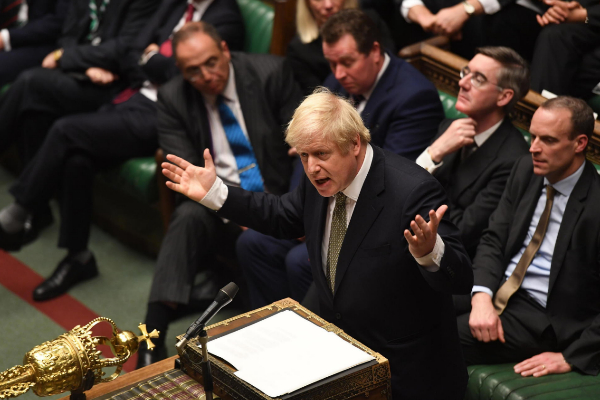- Calendar: The key dates of Brexit: in 2020 the future relationship with the EU is decided
- United Kingdom: Turgeon 'busts' the Queen's Speech claiming a second independence referendum in Scotland
"Premier" Boris Johnson has urged Parliament to approve its agreement to end Brexit on January 31 and prevent an extension of the transitional period beyond December 2020. The conservative leader aims to win the first vote on Friday thanks to his new absolute majority of 365 deputies , who pledged in advance to give their support.
Johnson justified the most controversial part of his Brexit law by claiming that consenting to an extension of the transition period would leave the United Kingdom "like Prometheus chained on the rock, with the eagles pecking at his liver and pecking again in an endless cycle."
"The oven is on and the gas marker is at 4, so we can have this resolved at lunchtime or one of a late lunch," said the "premier" at the opening of the debate, which will conclude with a second "reading" of the Brexit law and the first and significant vote (the text must then be passed to the House of Lords and will be finally approved at the beginning of the year).
Johnson's law eliminates all concessions made to the opposition before the 12-D elections, from parliamentary control of the negotiation process of the future trade agreement with the EU to alignment with workers' rights and environmental rights, going through the reception of refugee children.
"At least show some decency with refugee children," Labor Natasha, one of Jeremy Corbyn's possible successors, snapped. Johnson replied by claiming that the United Kingdom will continue to host refugee children, "but without EU supervision."
The "premier" reiterated his "firm commitment to keep Northern Ireland within the United Kingdom", despite the fact that his agreement with Brussels admits a differential treatment for the Ulster and opens the door to the creation of something similar to an internal customs in The Irish Sea.
Johnson stressed that Brexit's law "should not be seen as the victory of a party or a faction." "It is time to act together," he concluded, extending his offer to the 202 Labor deputies and the rest of the opposition parties, who anticipated their vote against.
The foreseeable approval of the law has been welcomed with a mixture of relief and concern in Brussels. The EU believes that the future trade agreement with London cannot be negotiated in just eleven months and that the door should be left open to an extension of the transitional period. Johnson's decision to cancel that possibility is seen as a new argument from the "premier," who intends to use his country's position of strength at the start of the new negotiations.
According to the criteria of The Trust Project
Know more- United Kingdom
- London
- Jeremy Corbyn
- Boris johnson
- Brexit
Elections United Kingdom The toxic glossary of Brexit
Elections in the UK New Scottish independence wave on the back of Brexit
Boris Johnson hides in a freezer to avoid television at the close of the campaign

